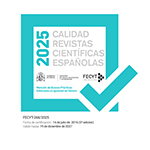The support of the German Liberal Party and the Friedrich Naumann Foundation to their Spanish counterpart during the Transition
Abstract
This article analizes the support that the German liberal party, Freie Demokratische Partei (FDP), provided to its Spanish counterparts, from the end of Francoism until the first democratic elections held in Juny 1977. The primary sources for this work have been documentation (originating) from the German Foreign Office and the German Federal Archiv; all of this was complemented with Spanish press of that time. Three main questions have been studied: the motivating factors behind the liberal`s involvement in the Spanish transition; the development of the Spanish liberal groups along the analized period; and how the German support to its Spanish partners took form. The conclusions highlight also three aspects: the first one, that despite the German will and the disproportionate political and economic effort, the Germans did not achieve their objective of a united liberal party in Spain; the second, the Spanish partners benefited from the German support but didn`t gave up with their political individualism; and finally, the emergence of the UCD and the integration of a large part of the Spanish liberal parties in it frustrated the initial target of the FDP. After that, the German liberals had to conduct the objective to a new goal: the enforcement of the liberal ideology of their very atomized and insignificant partners.
Downloads
Article download
License
Aquellos autores/as que tengan publicaciones con esta revista, aceptan los términos siguientes:
a. Los autores/as conservarán sus derechos de autor y garantizarán a la revista el derecho de primera publicación de su obra, el cuál estará simultáneamente sujeto a la Licencia de reconocimiento de Creative Commons Reconocimiento-No comercial-Sin obra derivada 4.0 España que permite a terceros compartir la obra siempre que se indique su autor y su primera publicación esta revista.
b. Los autores/as podrán adoptar otros acuerdos de licencia no exclusiva de distribución de la versión de la obra publicada (p. ej.: depositarla en un archivo telemático institucional o publicarla en un volumen monográfico) siempre que se indique la publicación inicial en esta revista.
Plagio y fraude científico
La publicación de un trabajo que atente contra los derechos de propiedad intelectual será responsabilidad de los autores/as, que serán los que asuman los conflictos que pudieran tener lugar por razones de derechos de autor. Los conflictos más importantes pueden darse por la comisión de plagios y fraudes científicos.
Se entiende por plagio:
1.Presentar el trabajo ajeno como propio.
2.Adoptar palabras o ideas de otros autores sin el debido reconocimiento.
3.No emplear las comillas u otro formato distintivo en una cita literal.
4.Dar información incorrecta sobre la verdadera fuente de una cita.
5.El parafraseo de una fuente sin mencionar la fuente.
6.El parafraseo abusivo, incluso si se menciona la fuente.
Las prácticas constitutivas de fraude científico son las siguientes:
1.Fabricación, falsificación u omisión de datos y plagio.
2.Publicación duplicada.
3.Conflictos de autoría.












